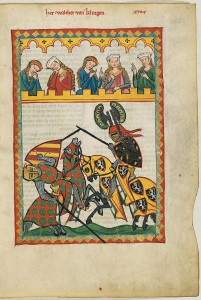
It was at this joust that Sir Francis Bryan lost his eye when a lance splintered. He was lucky that the splinter was not driven into his brain as in the case of Henry II of France in 1559.
Here is Edward Hall’s account of the joust, which was followed by “a costly banquet”:
“This yere the kyng on Shrouetewesdaie, kept a solempne lustes athis Manour of Grenewiche, he hymself and. xi. wer on the one part, and the Marques of Excester with, x, were on the other parte: the Kynges barde and base and all his bende, wer of cloth of gold and siluer richely embraudered, with a mannes harte in a presse with flames about it, and in letters were written, Declare ie nose, in Englishe, Declare I dare not, the Marques and his
bend wer in Grene Veliiet, & crimosyn sattyn embrodered with hartes burnyng, and ouer euery harte a Ladies hand commyng out of acloude, holdyng a garden water pot, which dropped siluer droppes on the harte. At this Iustes was many a spere broken and by chaunce of shiueryng of the spere, sir Frances Brian lost one of his iyes. After these Iustes, the king made to the Quene, and lordes and ladies a costly banket, and did seruice to the Queue and ladies hymself.”
The theme of the pageant and Henry VIII’s motto ‘Declare I dare not” showed clearly that the King had found a new love, and it is thought that he was referring to Anne Boleyn. It was a courtly love display in the best chivalric tradition and I suspect that Henry had no idea at this point that Anne would be any more than a flirtation or possibly a mistress. Of course, Anne was to refuse to become his mistress, even his maîtresse en titre (official mistress), and Henry’s love for her would lead to him offering her marriage instead and eventually breaking with Rome.
You can read more about Henry VIII’s relationship with Anne Boleyn in the following articles:
- Henry VIII Falls in Love with Anne Boleyn
- A Timeline of Anne Boleyn’s Relationship with Henry VIII from 1528-1533
Notes and Sources
- Hall’s Chronicle, Edward Hall, p707-708
Also on this day in history…
- 1478 – Traditional birthdate of Sir Thomas More, Henry VIII’s Lord Chancellor, in Milk Street, London.
- 1531 – Convocation ordered to recognise Henry as “sole protector and supreme head of the English church and clergy”. The resulting “haggling” results in Thomas Cromwell adding the phrase “so far as the law of Christ allows”.
- 1587 – Sir Amyas Paulet read out Mary, Queen of Scots’ death warrant to her, and informed her that she would be executed the following day.